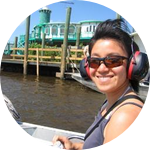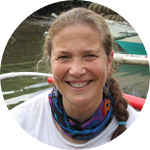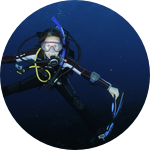About This Project
Last year I spent 3 months searching for seahorses in Thailand, but found only 8 individuals. This was surprising because Thailand is the world's largest exporter of seahorses, sourcing its seahorses from local fisheries. Why were seahorses so hard to find? Was I looking in the wrong places, using the wrong methods, or had so many seahorses been captured in fishing gear, were there none to be found? My future research will seek the answer.Ask the Scientists
Join The DiscussionWhat is the context of this research?
In 2013, I began my PhD research with three months of underwater surveys searching for seahorses along Thailand's western coast to gather basic information on seahorse distribution. Unfortunately after an intensive search effort, I found only eight individuals.
Before starting my research, I consulted local marine biologists and our Thai partners to identify potential mangrove, seagrass and coral reef habitat. I used methods that had been tried and tested by seahorse researchers in other areas. So why did I find so few seahorses? Could it be by chance that I was looking in the wrong places? Or for some reason these established methods didn't work well in Thailand? Or had there been so much fishing, and therefore accidental capture of seahorses, that they were just hard to find?
After gathering information on seahorse habitat from fishers, and additional field seasons with collaborating researchers, we have now identified several locations with relatively high seahorse abundance.
My upcoming field season will involve visiting these sites to compare methods for searching for seahorses to determine which method is the most effective. Additionally my research will determine the optimal number of times a researcher must survey a site to feel confident about the number of seahorses living there.
What is the significance of this project?
Seahorses are all listed on Appendix II of the Convention on International Trade of Endangered Species (CITES), which means countries have to prove their exports of seahorses are not harmful to wild populations. Thailand, the world's largest exporter of seahorses for international markets, is assessing its local seahorse populations in support of sustainable trade. Its efforts will to create an adaptive management program for seahorses to ensure the sustainability of wild populations, seahorse fisheries, and trade.
Project Seahorse, the world authority on seahorses, is assisting Thailand with its research needs. As a Project Seahorse Ph.D candidate, the results of my research will contribute to these efforts by providing information to managers about which methods to use to monitor their wild populations and local fisheries, and the duration and frequency of monitoring.
We need to act now to ensure they are effectively managed for conservation. Sampling to gather data on animal abundance and distribution is a essential to this goal. Although these data can be difficult and costly to attain, they are at the heart of identifying conservation needs and testing the efficiency of management actions. My results will be highly applicable because questions surrounding detection rates, field methods, and sampling regimes are applicable across all species and disciplines.
What are the goals of the project?
My project has the following research goals:
- Determine which underwater search methods effectively and efficiently identify seahorses at a given research site.
- Evaluate the ideal frequency and duration of searching for seahorses to provide the researcher with confidence about the relative abundance of seahorses at a given research site.
- Support Thai Authorities sufficiently to implement the CITES recommendations, assess seahorse conservation status and take appropriate action where needed.
- Increase in-country capacity in Thailand for seahorse monitoring, research and conservation.
Budget
I am seeking $2400 to support a local research assistant for three months ($800 / month) during my second field season. If additional funds are raised, they will be put towards other field expenses such as scuba tank rentals and fuel costs for the boat. Thank you for supporting seahorse conservation, sustainable fisheries, and my doctoral research!
Endorsed by
Meet the Team
Team Bio
On June 12, 2002, the world as I knew it changed. I stepped into mywetsuit, donned my mask, and stuck in my regulator as I took my first plunge into what would turn into a life long pursuit of marine conservation and research. My true passion for the ocean revolves around conservation and seahorses. Prior to starting my PhD, I worked in Ceará, Brazil to study habitat preferences of seahorses and apply my work towards conservation of the aquarium trade. Since my first seahorse observation, I have been determined to complete a PhD on seahorse populations in an effort to help with their conservation and management. I am currently a PhD candidate with Project Seahorse at the University of British Columbia, in Vancouver, Canada, on my way towards accomplishing this goal. My research interests lie in ecology and population dynamics, specifically to address seahorse conservation, threats and management. After my PhD it is my intention to teach abroad at the university level.
Press and Media
Want to Follow My Research?Blog: Seahorse Adventures
Twitter: @L_Aylesworth
Want to learn more?
Why study seahorses?
What is Project Seahorse?
Want to help seahorses? Check out iSeahorse
Phuket Gazette Newspaper Article: Saddle up, seahorse lovers
Additional Information
Why local research assistants are importantThe unsung heroes of conservation research, dedicated field assistants are priceless. A good field assistant not only understands your research goals but also shares in your passion for the subject matter - in this case searching for seahorses and sustainability. They willingly put up with the demands of field research - long hours, remote locations, and physical exhaustion with little financial reward. Additionally, working in a foreign country can be logistically challenging. A local assistant knows his or her community, and will help me to build bridges between my research and their lives. By employing a local research assistant, who would otherwise lack the skill set necessary to monitor seahorse populations for sustainability, I can increase local in-country capacity for marine conservation.
Rewards
Fund $5 or more: Thank you and acknowledgement on Twitter and Blog
Fund $10 or more: Receive Lindsay's Top 10 Favorites of Seahorse Research in Thailand
Fund $25 or more: Name your own seahorse. Choose the name of one of the seahorses we find. You'll recieve a photo of your seahorse along with relevant stats about how big it is and where it lives.
Fund $50 or more: Receive a postcard update from the field along with a signed autographed photo of our local research assistant in action
Fund $100 or more: Receive a box of seahorse chocolate and all of the above.
Fund $250 or more: Group / Teacher package. Get your group or class to donate receive a personal group presentation of "Searching & Seeking for Seahorses & Sustainability" and 5 weekly emails of "updates from the field & recent photos."
Fund $500 or more: Personal skype phone call to answer project questions and all the above
Fund $1000 or more: Acknowledgement in publication and all the above
Project Backers
- 36Backers
- 126%Funded
- $3,040Total Donations
- $84.44Average Donation



